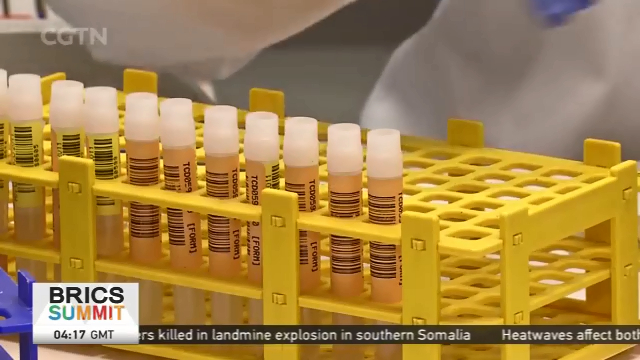
15:12, 27-Jul-2018
BRICS Summit 2018: Members agree to join forces in development of vaccines
Updated
15:05, 30-Jul-2018
03:03

The healthcare challenges facing many African countries have been well documented. CGTN's Angelo Coppola explores whether there's a need for more cooperation on the development of vaccines among BRICS countries.
Perhaps one of the biggest public health interventions, that can solve many of the challenges continentally and within BRICS countries, are vaccines. They have saved hundreds of millions of lives globally.
PROF. HELEN REES CO-DIRECTOR, ALIVE CONSORTIUM "There really is a growing interest across all five countries in vaccine development. Both from the basic science, developing new cleverer vaccines, new vaccines for new emerging diseases, but also trying to get more manufacturing out there for more generic vaccines so that we can have a more reliable supply and potentially a more cheaper, more competitive supply of vaccines for the market place. I think all five countries have got both the science and the manufacturing emerging capacity, some are much more advanced than others, such as India and China, but I think it's something, a really shared interest, which if we put everyone in a room, I think we'd find real commonalities."
Africa has seen its fair share of diseases which could have been prevented or managed differently.
PROF. HELEN REES CO-DIRECTOR, ALIVE CONSORTIUM "The African continent has one of the biggest challenges worldwide in terms of what we call vaccine preventable diseases. We saw this recently with the Ebola outbreak, where we didn't have the vaccine and we desperately needed a vaccine, and amongst African scientists there was actually a call to say we should have been able to step up to the plate. We want to be able to solve these problems ourselves and in our own settings."
Several of the continent's health ministers and finance ministers got together some time ago and signed the Addis declaration.
PROF. HELEN REES CO-DIRECTOR, ALIVE CONSORTIUM "Which actually said, amongst other things, that we need to prioritize vaccine preventable diseases and new vaccines. Also saying that they wanted to prioritize manufacturing of vaccines more strongly in African countries. So that you have more of both a domestic and a regional supply of vaccines. So there's a real interest in this."
There's a very specific need to find African solutions, given the constraints faced in many African countries.
PROF. HELEN REES CO-DIRECTOR, ALIVE CONSORTIUM "As technology emerges, we want better vaccines, simpler vaccines, vaccines that you don't need refrigerators, cold chains to get out to the periphery. So there are many research challenges and there are many diseases that we still have to tackle in this region."
On a BRICS level there's also a keen interest to find solutions.
PROF. HELEN REES CO-DIRECTOR, ALIVE CONSORTIUM "And we have already, from South Africa had some dialogue with China for example and with India. I think there are real opportunities to look at scientists across the countries to say, are there common diseases, such a influenza, are there things that are going to be common to all of us that we could actually try and pool our expertise?"
ANGELO COPPOLA JOHANNESBURG, SOUTH AFRICA "Cooperation between the BRICS health ministers to find mutually beneficial home grown solutions, using the combined expertise of all five countries, appears to be a foregone conclusion. Everyone understands the challenges and the need to pool resources. I'm Angelo Coppola for CGTN in Johannesburg, South Africa."

SITEMAP
Copyright © 2018 CGTN. Beijing ICP prepared NO.16065310-3
Copyright © 2018 CGTN. Beijing ICP prepared NO.16065310-3